Stoicism, Bushidō, and Chivalry: Towards a personal code of ethics
The world is complicated, and full of grey areas. I've personally found it helpful to maintain a personal code of ethics; this essay is more or less a writeup of my journey to date, with a brief explanation of how I understand and apply certain virtues.
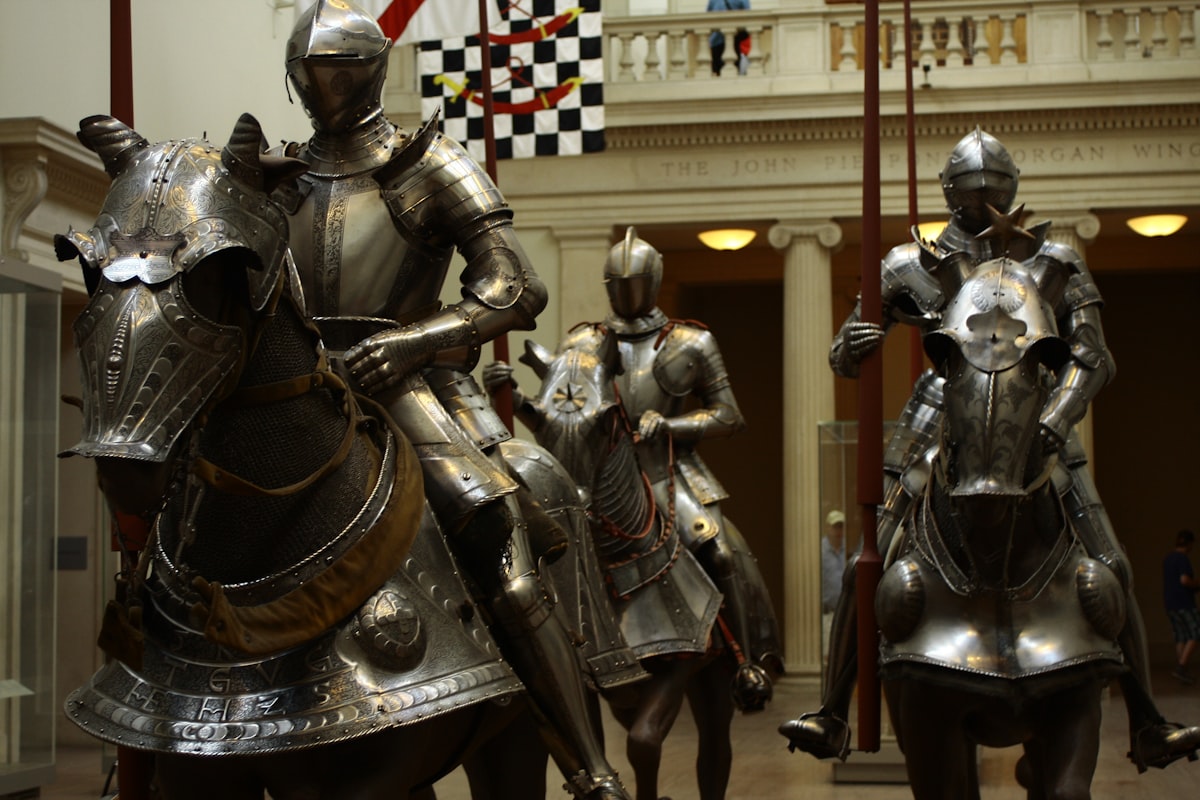
The world is complicated, and full of grey areas. I've personally found it helpful to maintain a personal code of ethics that I've built around studies in various schools of thought. The ones I've found most useful in my studies in philosophy and arete (the Classical Greek notion of moral excellence) have been stoicism, bushidō, and chivalry. This code of ethics is codified as a series of virtues; perhaps unsurprisingly, it was quite relevant in identifying my life's purpose. The act of examining what virtues were important to me served as a valuable tool for uncovering what I wanted my life to look like.
My approach has been to identify these types of moral frameworks codified as a series of virtues. It's useful to start with something as a point of inquiry and critical analysis. This gives us virtues to consider, expand our understanding on, and finally, critically, decide what place—if any—they have in our lives, and in this way building up moral intelligence. When I was in the Alameda County Sheriff's Academy, we had a series of classes on ethics in policing. One of the exercises was to take a sheet with list of about a hundred virtues or things that were important to us. Our first instruction was to cross ten things off this list: "if you had to sacrifice certain values to uphold others, which would be the first to go?" This exercise repeated in various numbers until we were left with just two items. If I remember right, my final two were honor and integrity. It's a useful exercise because you simply cannot live up to a hundred virtues at all times and still maintain a consistent internal worldview. At the same time, two virtues felt like too few. I didn't like having to sacrifice some of the values that I ended up cutting for the sake of the exercise. It seems to me that the ideal is somewhere in the four to eight virtue range. Interestingly, the systems I looked at all fell into that range.
There are core virtues that we can't compromise on if we are to live correctly, and there may also be aspirational virtues - ones that we would like to develop, but that aren't (yet) a part of our core.
The word virtue, like so many other words, has become virtually meaningless; so much so that the term virtue signalling has come to mean the act of putting on airs about your morals so as to take the socially acceptable moral high ground. On my left wrist is tattooed the letters EQV, which stand for the Latin phrase esse quam videri; that is, to be rather than to appear. In modern times, the rise of social network leading to artificially inflated social clout has led to a social trait of apperere quam esse—to appear, rather than to be. For the purposes of my life, I mean a virtue as some trait that serves the role of arete. It is through virtues that we attain and live certain values. My core virtues must be character traits that I am willing to live because when I do not live up to them, I feel out of place. I tattooed EQV on my wrist because, if nothing else, this is how I want to be. Integrity and honor. As Musashi wrote, "I will not sacrifice my honor even in the face of death," or from an alternate translation, "You may abandon your own body but you must preserve your honor."
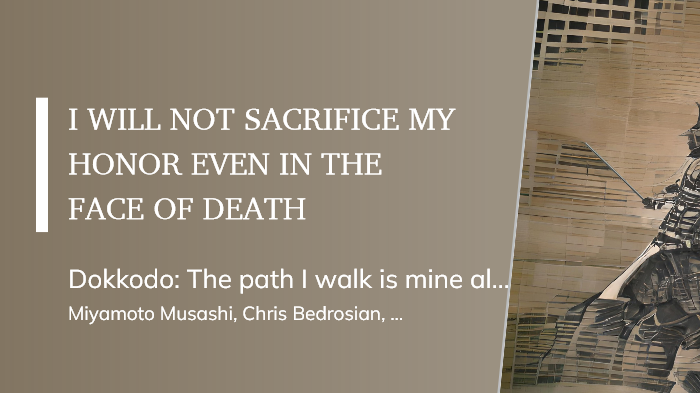
Engaging in this process has led to reading through a lot of source material. This requires critical thinking and additional exploration: many of the sources I've read need some additional historical context to understand, and they come with the unstated caveat that you cannot use modern thinking to understand ancient thinking. I use these sources as a starting point, understanding that there are typically many critics—critics who love to put their purported moral excellence on display by dragging everyone down to their level; critics who have put the work into understanding these works and level useful and constructive criticisms; critics whose worldviews are so alien from mine that I cannot use their criticisms; critics whose life experience does not grant their ideas weight. The world is fraught with critics but it is instructive to remember criticism does not automatically grant the critic's ideas authority any more than writing a book automatically grants the author's ideas authority. Critical thinking is the shield against the forces of weak intellectual arguments (I suppose that rhetoric would be the appropriate the accompanying sword).
Virtues must also be oriented to your worldview: if we have different worldviews, I will consider your arguments, though they will be filtered for relevance through my own set of values. So it is with my study of both philosophy and ethics: take what I find useful and integrate them into my ethics.
This essay is more or less a writeup of my journey to date, with a brief explanation of how I understand and apply certain virtues. At the end, I've included the core virtues that I've decided on in my own life.
The Cardinal Virtues
The ancient Greeks had the cardinal virtues: prudence, justice, fortitude, and temperance. These seem as good a starting point as any, perhaps mixed in with my two other virtues of integrity and honor.
Prudence
Prudence (in Latin, prudentia, and in ancient Greek, phrónēsis) is the virtue of wisdom. The Strenuous Life (I am a member of class 070) strongly emphasizes the development of phronesis, of practical wisdom:
As author John Bradshaw puts it in his book, Reclaiming Virtue: Practical wisdom “is the ability to do the right thing, at the right time, for the right reason.”Brett & Kate McKay, Practical Wisdom: The Master Virtue.
Expanding on this, Brett McKay explains "[phronesis] is the acknowledgement that while some absolute truth exists, the right thing to do... can vary according to circumstances."
We as a society have tended towards outsourcing our thinking to our little oracles of sand and glass and light, seeking answers from its deep magic—and too often, tending to outsource our judgement to it. From navigation to basic arithmetic to always have an answer in every conversation, yes, even to philosophy and practical wisdom. Like any other skill or virtue, wisdom must be developed intentionally. Along the way, we will surely make mistakes in our application of wisdom. This is the way of personal growth.
Justice
Justice (in Latin, iustitia, and in ancient Greek, dikaiosýnē) is the virtue of fairness. Dikaiosýnē also carries the implication of righteousness, which I've found to be useful in understanding justice. It is acting rightly, treating others with dignity, respect, and fairness; I see it as carrying a sense of duty in your actions with others. This carries over into the legal system which, in theory, does right to the victims of crime or civil misconduct. It balances (à la the scales of justice) the needs of each individual with the needs of others. It is related to the virtues of equity (Aristotle's epieikeia) and charity, though distinct in the objectivity of its application—equity being, more or less, the equalization of justice considering special circumstances. Charity is tipping the scales towards others, typically due to a pressing need, and not as a duty.
The virtue of righteousness is probably one of the two most instilled in me when I was younger by way of the church. We were always to live righteously.
Fortitude
Fortitude (in Latin, fortitudo, and in ancient Greek, andreía) is the virtue of courage, strength, and endurance. It is the ability to face danger and harsh conditions, to outlast hard times, and to have capabilities to bring to bear in the difficult times. It is the understanding, as the old proverb says, that "this, too, shall pass." It is easy to be virtuous when times are easy or you feel that you have the support of others, it is not so easy to stand alone in your ethics or to live your purpose when the world seems to stand against you.
The ancient Greek notably did not see a distinction between mind, body, and character. That is, a strong mind with a weak body is no different than a weak mind with a strong body. Strength is important: strength of intellect, strength of body, strength of character. In his manual on Starting Strength, Mark Rippetoe writes "A weak man is not as happy as that same man would be if he were strong."
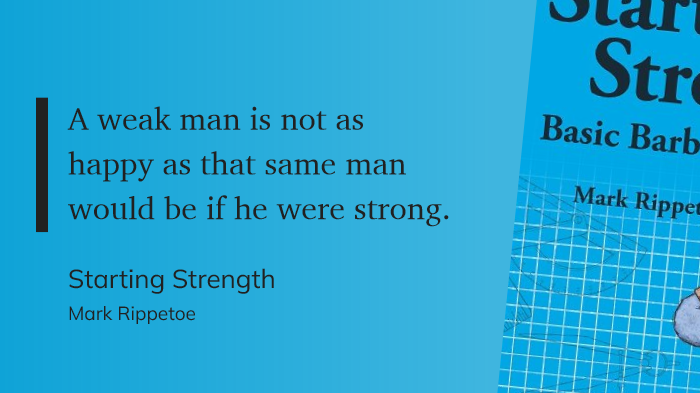
The process of exploring virtues develops our moral strength, guided by phronesis.
Temperance
Temperance (in Latin, temperantia, and in ancient Greek, sōphrosýnē) is the virtue of self-control and discipline. Specifically, sōphrosýnē refers to an ideal of arete and intellect, leading to being well-balanced. This balance is the expression of temperance. In conjunction with fortitude, it involves not eating too much and not eating too little, not drinking too much - sōphrosýnē was often used to describe knowing your limit when drinking.
Discipline is a key virtue in living a good life: you don't need motivation if you have discipline, so even when times are hard and your motivation is lagging, with discipline, you'll keep going. In his book Can't Hurt Me, David Goggins wrote "The reason it’s important to push hardest when you want to quit the most is because it helps you callous your mind. It’s the same reason why you have to do your best work when you are the least motivated."
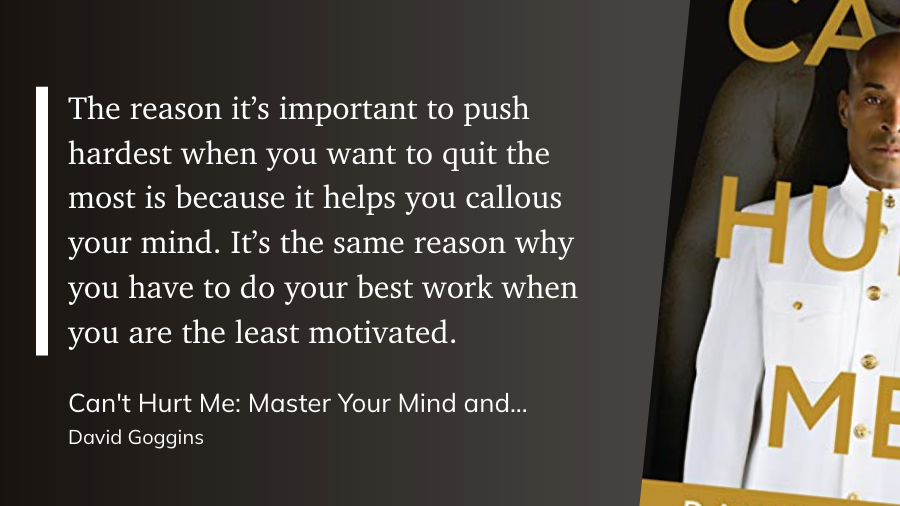
The Classically virtuous life
These four virtues combine together to create a person who is well-balanced, disciplined, capable, righteous, and wise. Prudence leads one to make good decisions towards a virtuous life, justice guides our dealings with others, temperance guides our dealings with ourselves, and fortitude builds our character.
The Stoic Virtues
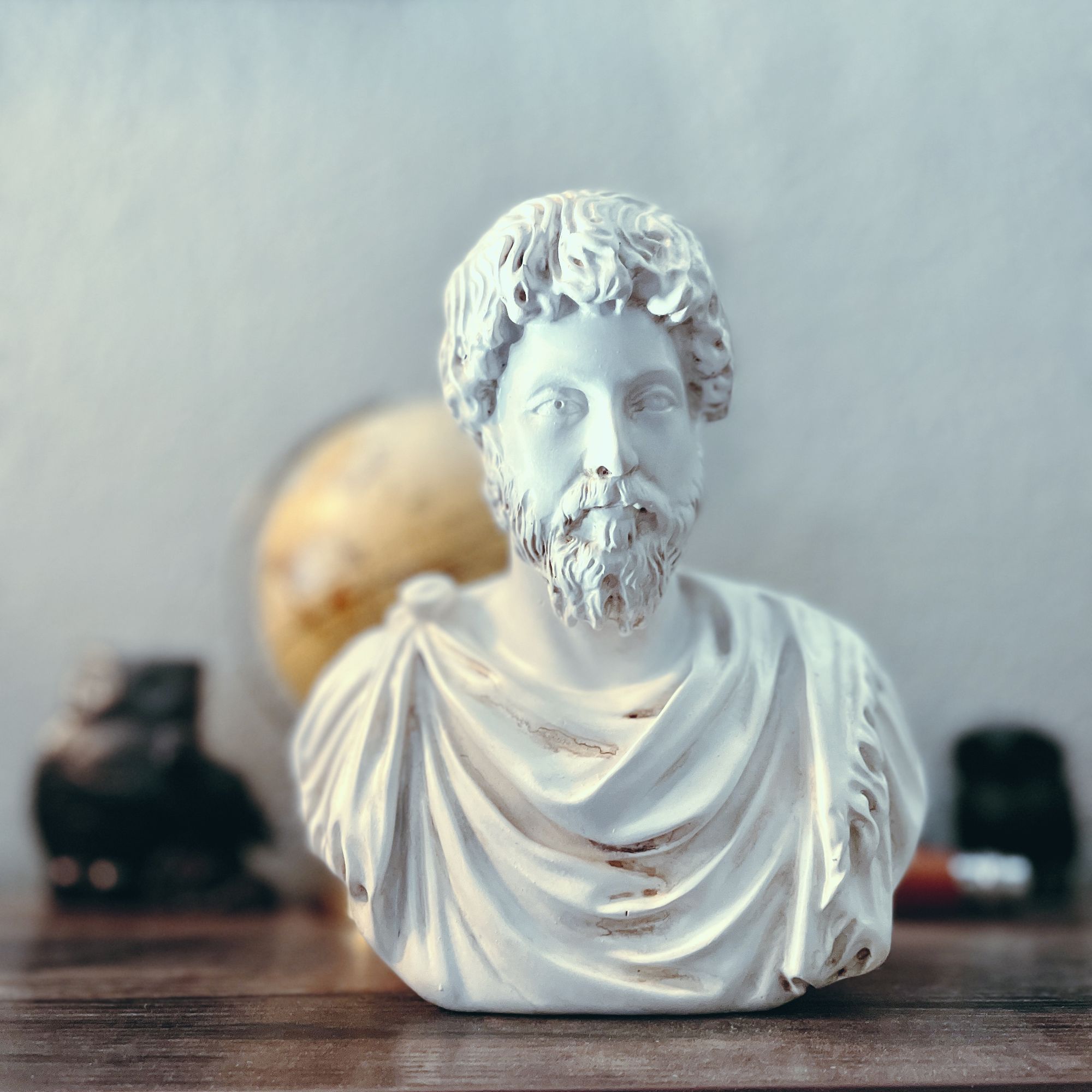
Stoicism is another philosophical system from the classical period that has been used by many in the intervening years as a foundation for living a good life. For most of my life, it's the closest system that I've used in my own personal moral system.
The Stoics came up with their own virtues, similar to the cardinal virtues—of course, this is a simplification, as any philosophical group will have its own take. In the modern application of Stoicism, probably popularized by Ryan Holiday's books and his site, The Daily Stoic, these four virtues are understood as justice, truth, self-control, and courage. These are essentially the cardinal virtues, with the substitution of truth for justice.
"If, at some point in your life, you should come across anything better than justice, truth, self-control, courage—it must be an extraordinary thing indeed.” —Marcus Aurelius
Truth
Truth (in ancient Greek, alethia) is a virtue of that which is evident. It is summed up in the phrase "esse quam videri," in which truth here means the reality rather than the appearance. Alethia refers to the idea of truth in philosophy, that which is factual. In practical terms, it is basing your actions and ethics on the factual nature of the world, rather than an ideal. While you can work towards an ideal, that which works in an ideal world doesn't necessarily work in the real world.
I associate this sense of alethia with an idea of integrity: that is, integrity is living to a consistent internal framework, of being the person you say that you are. It is being evident in your actions.
The Stoically virtuous life
In my own practice of Stoicism, I've often heard the criticism that it is the inability to feel emotions. I've found that hiding emotions leads to living a certain kind of lie in which we do not acknowledge or understand our own internal state. Instead of not feeling emotions, a stoic person would take those emotions into consideration (i.e., understanding the conditions that phronesis would have us take into account) and act not according to emotion alone, and not letting those emotions rule us, but rather acting virtuously. A balanced, calm state of being allows us to keep those emotions from ruling us. In a practical application, setting emotions aside (while again taking them into consideration) can adjust the tone of our interactions with others, such as calming people in the face of a crisis or preventing a situation from escalating when we or others are angry. It allows us to communicate properly despite our internal state. Once again, phronesis guides to acting correctly, truth ensures that we are authentic both internally and externally, fortitude allows us to face whatever the world throws at us, and temperance gives us the discipline to live rightly.
As another practical application, I've found my stoicism has well equipped me to handle challenges in my life, including a combat tour, multiple life-and-death incidents that come up in my life. I've gone through therapy (and found cognitive behavioural therapy helpful in a limited scope), but the three things that have been the most beneficial for my mental well-being are sunlight, the Iron Altar (aka the gym, specifically the powerlifting rack), and stoicism. I've never felt unable to handle the world, and when I find myself in a rut, I make sure to bring myself back into alignment with those three things: get outside, supplicate before the Iron Altar, and ensuring that I am acting in accordance with stoic virtues. In these moments of ruts, I usually find that I am not living a life of balance and discipline, and drag myself back to it.
Bushidō
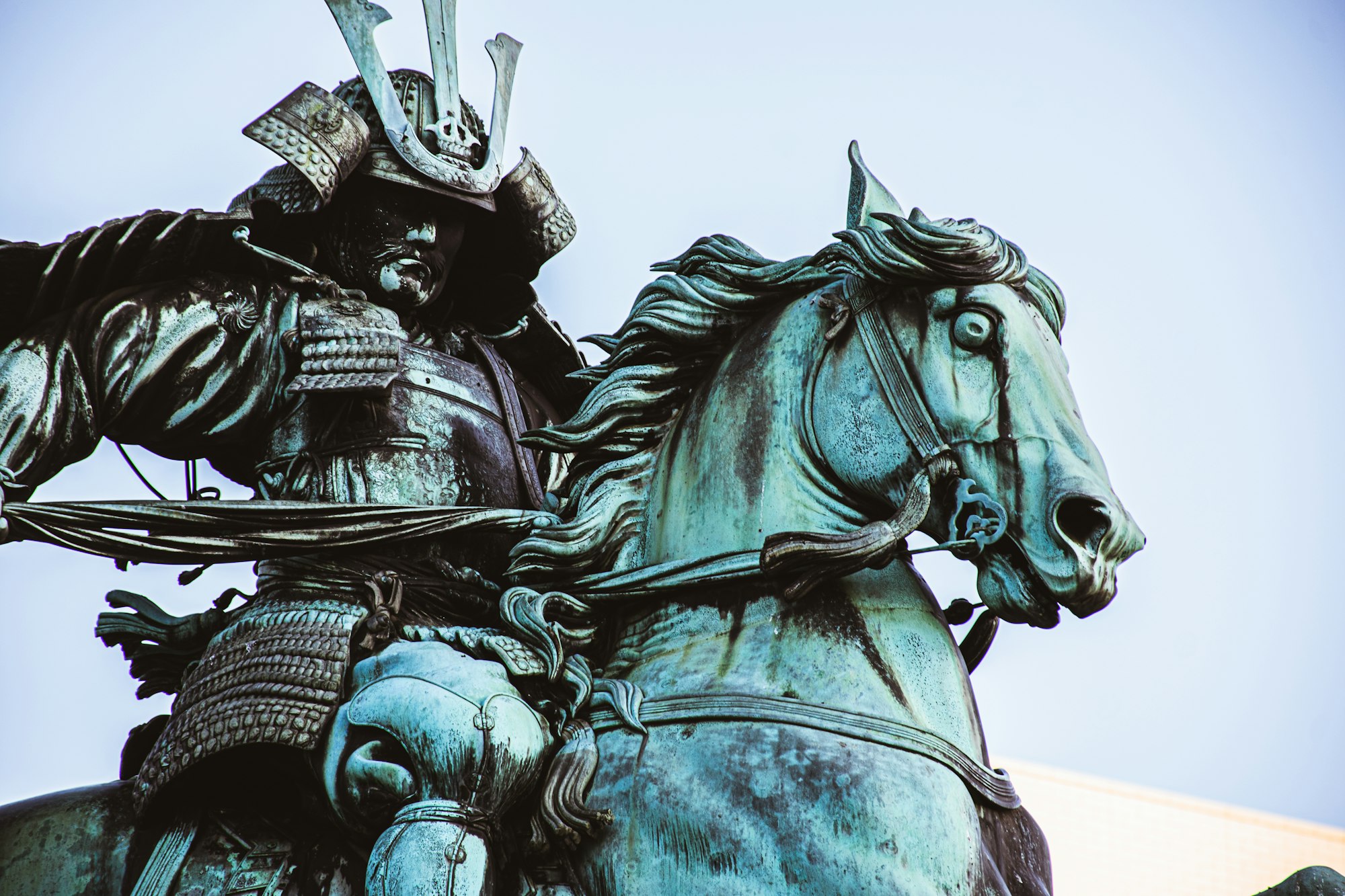
I started reading up on bushidō when I started practicing kendo. As we'll discuss with chivalry, it's important to keep in mind there isn't one historically accurate single definition of bushidō. However, in 1899 Inazō Nitobe published his book Bushido: The Soul of Japan. This book seemed to me to filter many of its ideas through a mindset of Western Chivalry, so I also draw on other sources such as Miyamoto Musashi's Book of Five Rings and Dokkodō, as well as Budoshoshinshu, Hagakure, and The Unfettered Mind. Many previous bushidō defined their own codes, but Nitobe espoused eight virtues: righteousness, courage, benevolence, politeness, honesty, honor, loyalty, and self-control. I don't speak or read Japanese, so I have to rely on translations. I've read an annotated version, as well as the summary of the code from The Art of Manliness.
This isn't an essay on the various forms of the man-at-arms across cultures, so I won't describe samurai other than to say they were functionally equivalent to the European knight, and that carries a sense of nobility, martial prowess, as well as being as generally well-educated and able to lead as one could be.
Righteousness
This is alternately translated as justice or rectitude. It is living one's life rightly, giving you confidence that you are living correctly. There is space to reconsider how you live your life, but if you live righteously, when it comes time to take actions, you have the confidence in the rightness of your actions. In the context of a warrior, you must be sure of your actions and thus by living righteously, you can fully commit unwaveringly to your course of action. From experience, hesitation in combat can get you killed, so you should have come to terms with your way of life before it comes to arms.
Courage
A warrior will face danger and stringent conditions, and must have the courage, the fortitude, to face these challenges; in facing them, to endure them; in enduring them, to overcome them. There is a fortitude of character that is required, there is a strength of body that is the reality of being a soldier. I've had to carry litters under fire, I've had to sprint while carrying a machine gun, I've been on patrols carrying close to a hundred pounds of gear. Courage without capability, that is, courage without strength, is suicidal.

Benevolence
This is alternately translated as compassion or mercy. A soldier has the power to take life, and must be judicious in their application of that power. There is a maxim among swordsmen that battles are best won with the sword remaining in its sheath; of course, once the swords come out, all bets are off. There are worldviews in which life is cheap, or perhaps some other lives have a negative value. Mine is not either of these, and life is important to me.
Politeness
I found this virtue interesting in context. Regardless of the respect that you feel for someone else, you still act with politeness. It doesn't require that you bend to their will, it doesn't mean that you can't communicate your dislike for that person. You treat other people with dignity and respect. It also means that you don't feel the need to flex your strength unnecessarily; it is a common understanding among soldiers that the most dangerous man in the room is often the quietest one.
Honesty
This is also translated as sincerity. The best description I've heard is that saying and doing are the same thing to a person who is honest and sincere: they say they're doing something, and you know they are good for their word. In the context of a warrior, someone with the capability to take lives who is deceptive or unclear about their intentions is not someone any society needs around.
Honor
Honor is a tricky thing to define; it's another word that means different things to different people. Personally, I consider it as an extension of integrity. It carries some sense of the Stoic sense of truth—that you are living a consistent internal code, but self-focused. You have to be the judge of your own character, and if you are living honestly with yourself, you act with dignity. If you are living as the person you need and want to be, you will naturally find your own value and self-worth. A person acting with honor owns their actions and the consequences that arise from these.
Loyalty
A warrior must be loyal to their commander, and to the people under their command. For the people for whom they feel a sense of loyalty, they are willing to take a bullet. This carries a sense of duty, of responsibility for one's actions, particularly in the sense of their military (or civic or otherwise) service. In modern times, we have seen by and large that companies do not have a corresponding sense of loyalty towards their employees, so it's less common these days to feel a sense of loyalty to your employer. Loyalty is a virtue that must be matched by others, as in a shared value in a group of people who are loyal to each other.
Self-control
Like with stoicism, self-control brings a balanced life. It also brings the discipline needed to live in balance.
Comparing Bushidō
Bushido encompasses the cardinal virtues and the stoic virtues. It provides a framework that is aimed at the warrior, but governs that warrior's dealings in martial, civil, and personal contexts.
Personally, I find bushidō interesting for combining the Stoic virtues with a sense of honor and loyalty.
Chivalric virtues
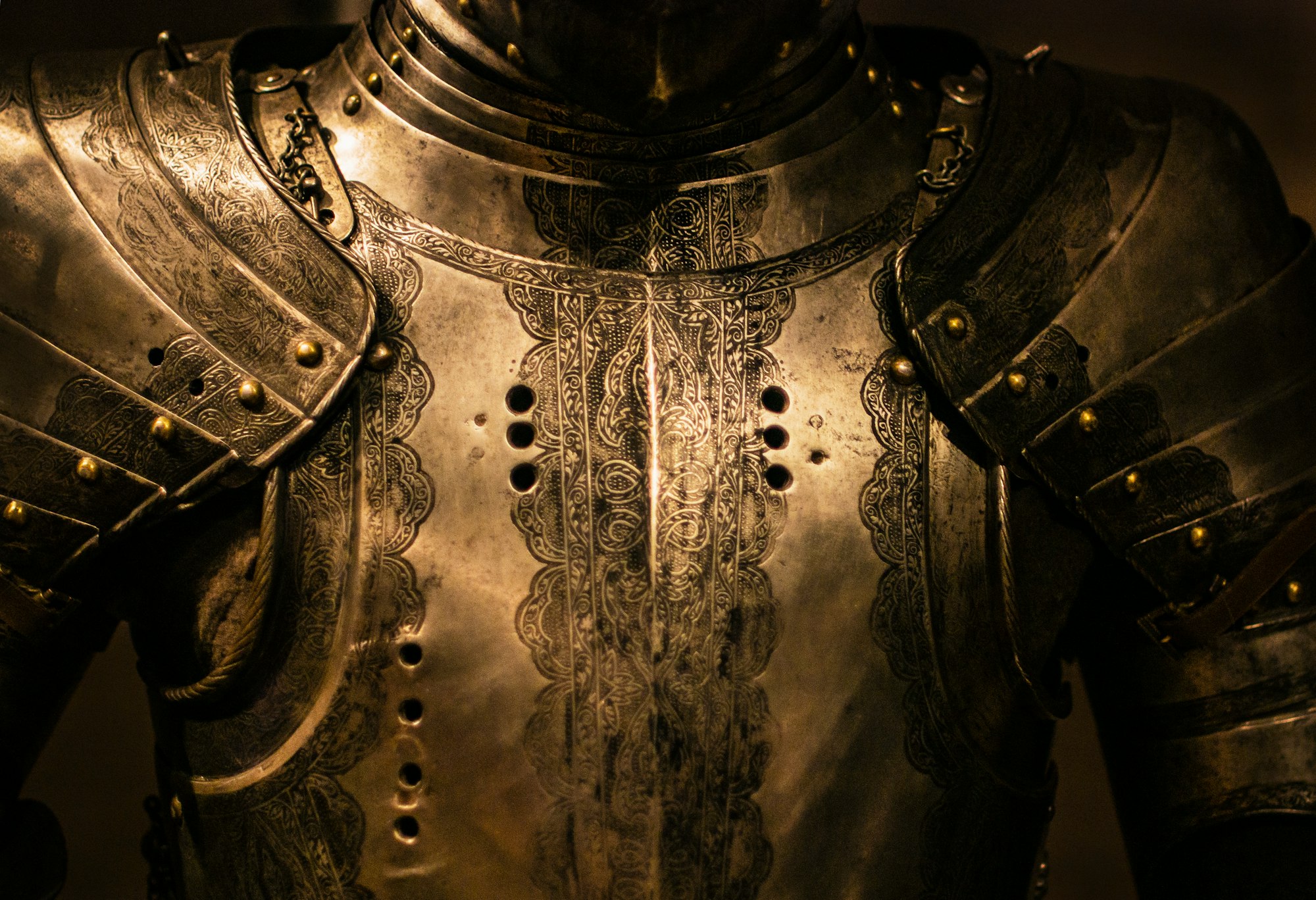
I've read a few different sources on chivalry; the most accessible is probably A Knight's Own Book of Chivalry by Geoffroi De Charny. I have a translation by Elspeth Kennedy. There are other sources as well.
Chivalric codes evolved from a series of virtues for soldiers who fought on horseback (as a form of proto-cavalry) to a set of virtues for a noble class of warriors who happened to (sometimes) fight on horseback. Chivalry derives from the old French term chevalier, a horseman.
A modern collection of chivalric virtues might be courage, justice, mercy, benevolence, faith, nobility, and hope. An older version might be the seven Christian virtues combining the four cardinal virtues with faith, hope, and charity. As a non-Christian, I will filter these last three through my own worldview.
Mercy
A knight will not be overly quick to arms, and will foster peace where they can. They have the confidence, knowing their training and capability for dealing death and violence, that they don't need to go straight to violence.
Faith
Faith is a sense of trust and integrity, similar to a combination of the bushidō values of honesty and honor.
Hope
A knight should inspire those around them to greater things. The presence of a knight on the battlefield often had a direct positive impact on the morale of the other soldiers (on their side). They don't have an overly optimistic worldview, but they will find the good in the world and cultivate it.
Nobility
A knight should live in service to noble principles; this isn't the same as grandiosity. It also carries to me a sense of living for a higher purpose, and not getting caught up in frivolous pursuits or entangled in the weeds (for example, not embroiling yourself in Internet arguments).
Charity
As described in the cardinal virtues, charity is going above a sense of justice to provide more for others when they need it.
Fiore de Liberi's virtues of a fencer
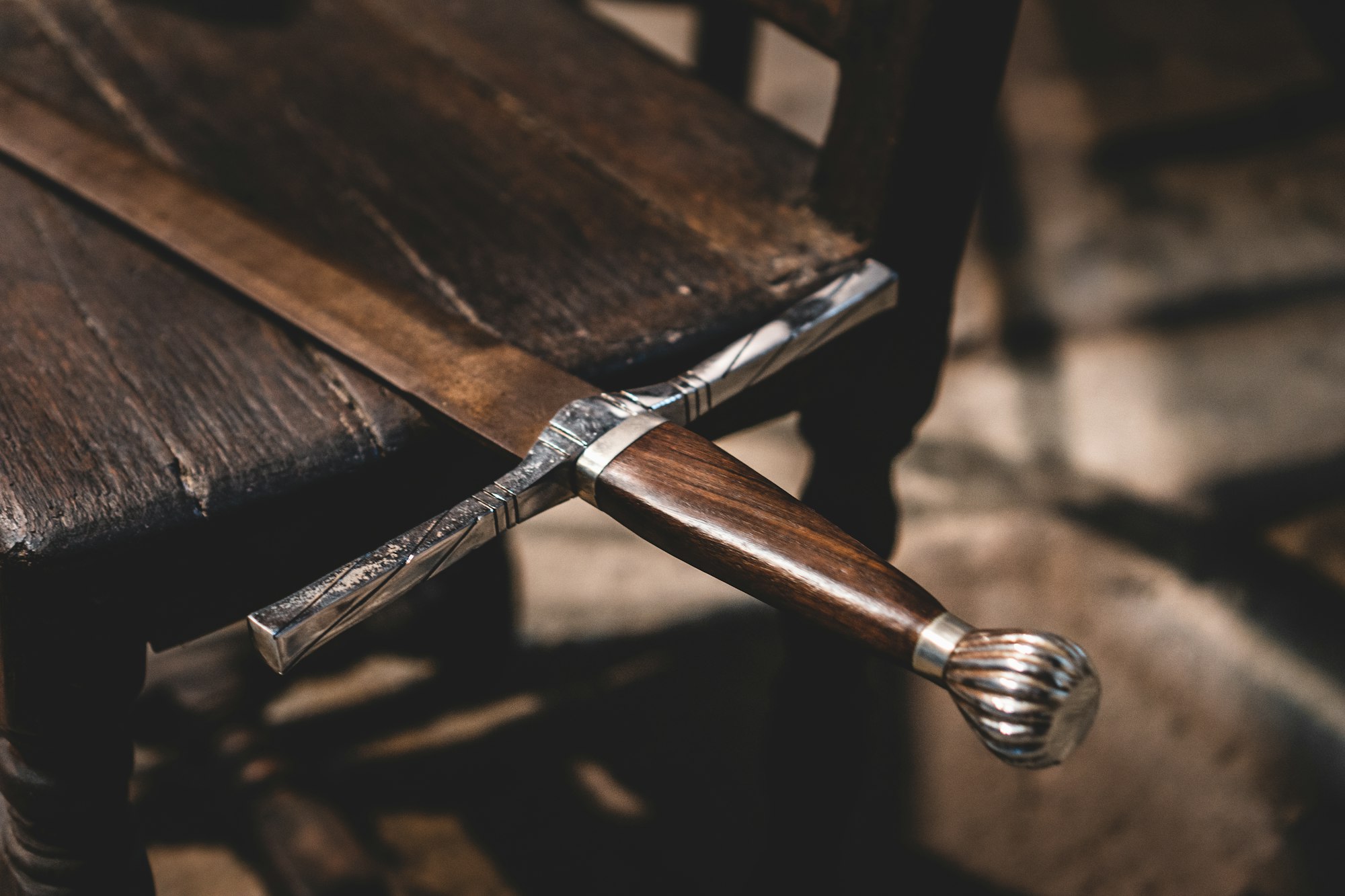
As I've taken up Historical European Martial Arts, I've been reading a lot of the historical treatises (e.g., fechtbuchen) covering how to fight with a sword (among other things). Fiore de Liberi described the four virtues of a fencer in his treatise on armed combat, Fior di Battaglia (the Flower of Battle). These four virtues are prudence, audacity, celerity, and fortitude. Prudence and fortitude we've seen in the cardinal virtues.
Audacity
"No one has a more courageous heart than I, the Lion, for I welcome all to meet me in battle."
Audacity is an extension of courage, but particularly towards facing foes in battle. The audacious fencer will take the initiative in battle, winning the vor (before) action and placing their opponent on the defensive. It also emphasizes the idea of not just courage, but ferocity (while balancing the other virtues) in your fencing.
Outside of fencing, courage describes the ability to face challenges head on, while audacity means taking risks that you assess match your life's purpose.
Celerity
"I am the Tiger, and I am so quick to run and turn, that even the thunderbolt from heaven cannot catch me."
Celerity is the virtue of being quick in your strikes, requiring you to move your blade smoothly, observing economy of motion. My kendo sensei described it as ensuring that each strike is singular and decisive, moving your shinai directly to the target with speed. In the Book of Five Rings, Musashi writes, "Speed is not part of the true Way of Strategy. Speed implies that things seem fast or slow, according to whether or not they are in rhythm."
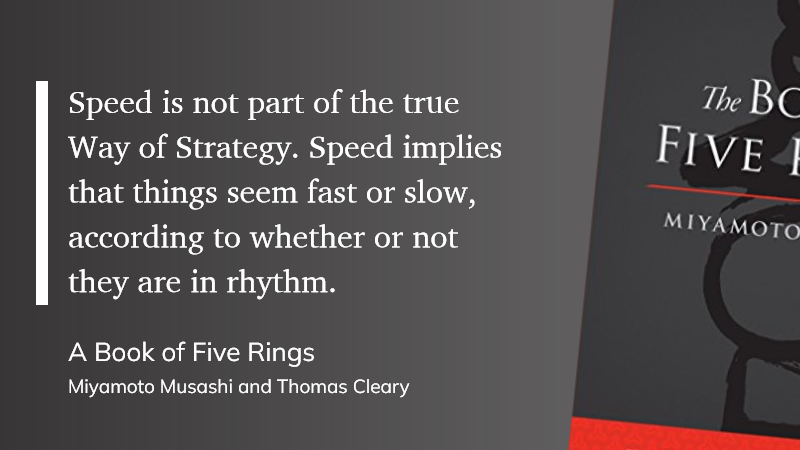
In fencing, you don't want to rush your attacks though: celerity isn't just being blindingly quick with your blade, it's not how fast you can dance the dance of steel. You must deliver your strikes in the proper tempo - the right time, without hesitation, delivered decisively, and not telegraphing your intentions ahead of time with wasteful motion.
Outside of fencing, you shouldn't take overly long to act, and you shouldn't waste time (e.g. observe economy of motion). Your actions should be decisive.
The Virtues
Here, I've listed all the virtues described above.
| Common name | Aliases | Frameworks | Description |
|---|---|---|---|
| Audacity | Ferocity, daring | Flower of Battle | Martial courage to take initiative in combat. |
| Benevolence | Compassion, mercy | Bushido | Not needing to flex your strength or resort to brute force right away. |
| Celerity | Speed, grace, economy of motion | Flower of Battle | Acting swiftly, decisively, and without wasting motion. |
| Charity | Caritas | Christian | Tipping the scales towards others beyond a sense of duty. |
| Equity | Epieikeia | The equalization of justice considering special circumstances. | |
| Faith | Chivalric | Honesty and honor. | |
| Fortitude | Fortitudo, andreía, courage, endurance | Cardinal, stoicism, bushido | The ability to face danger and harsh conditions, to outlast hard times, and to have capabilities to bring to bear in the difficult times. |
| Honor | Integrity | Bushido | Living according to a consistent internal code and being honest with yourself to live in that code. |
| Hope | Inspiration | Chivalric | Inspiring others around you, and cultivating the good in the world around you. |
| Justice | Iustitia, dikaiosýnē, righteousness, fairness, nobility | Cardinal, bushido | Acting rightly, treating others with dignity, respect, and fairness. |
| Loyalty | Duty | Bushido | Taking responsibility for your actions and taking a duty to protect those in your charge. |
| Politeness | Respect | Bushido | Regardless of your internal state, treating people with dignity and respect. |
| Prudence | Prudentia, phronesis, wisdom | Cardinal, stoicism | Doing the right thing at the right time for the right reason. |
| Temperance | Temperantia, sōphrosýnē, discipline, self-control, balance | Cardinal, stoicism, bushido | Living a well-balanced life with the discipline to live according to your ethics. |
| Truth | Alethia, honesty, sincerity | Stoicism | Being, not appearing. |
A balanced code
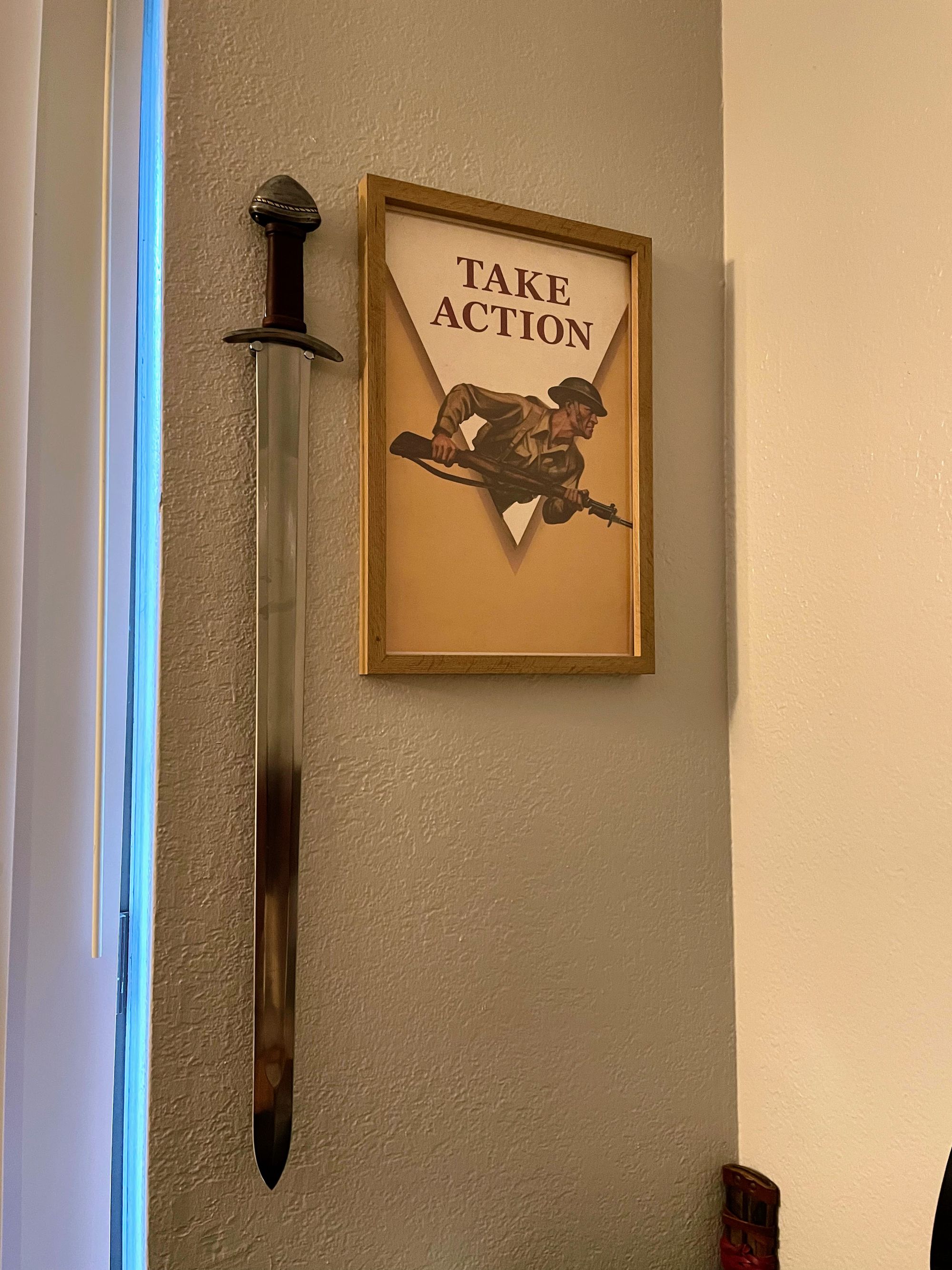
I know from experience that the Stoic virtues have served me well, and I know from investigation that honesty and integrity are also very important to me. I also like the fencing virtues of audacity and celerity, though I'm not sure that audacity is a core virtue so much as an aspirational value. As I explored my life's purpose, I know the idea of hope is important to me as well; I've found it important to build up the people in my life. Right now, I'm living off the following code:
- Celerity: take decisive action in the right tempo.
- Fortitude: build up strength of mind, body, and character; and develop skills and capabilities to be of service to others.
- Honor: live consistently with your code of ethics, and be honest with yourself if you find your core virtues changing.
- Hope: inspire those around you to live the best possible lives they can.
- Justice: live a noble life, not getting caught up in the weeds of banality or frivolity.
- Temperance: live a well-balanced life, and have the discipline to maintain it.
- Truth: esse quam videri.
More importantly than selecting (and announcing) these virtues is the process of understanding them, of choosing them, of examining my life and considering how best to live.

Comments ()